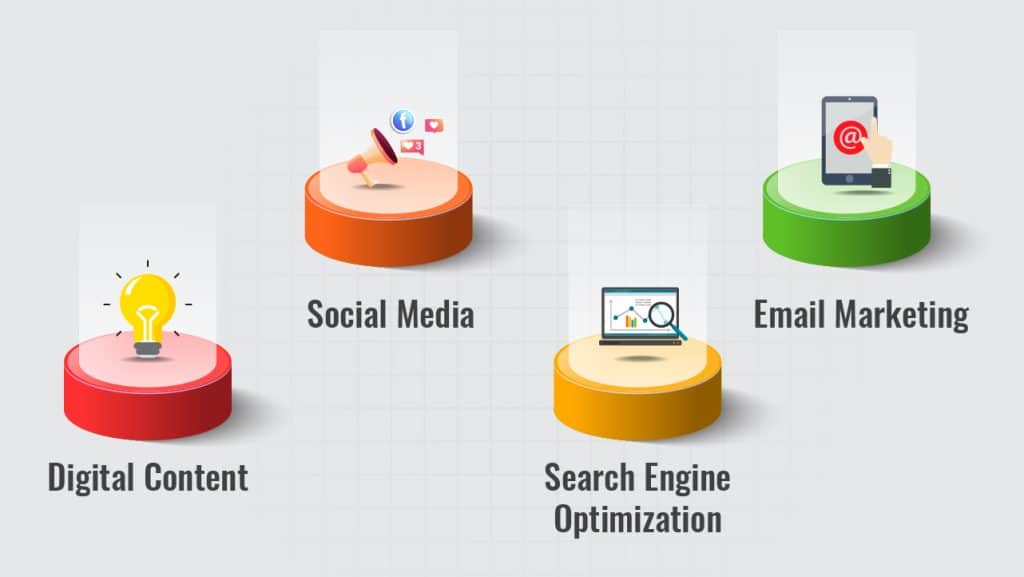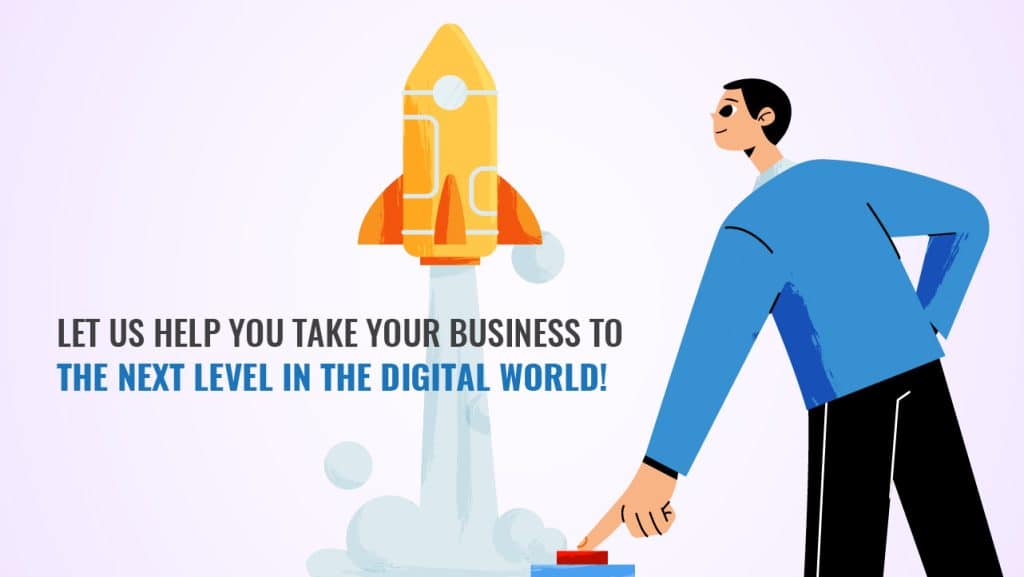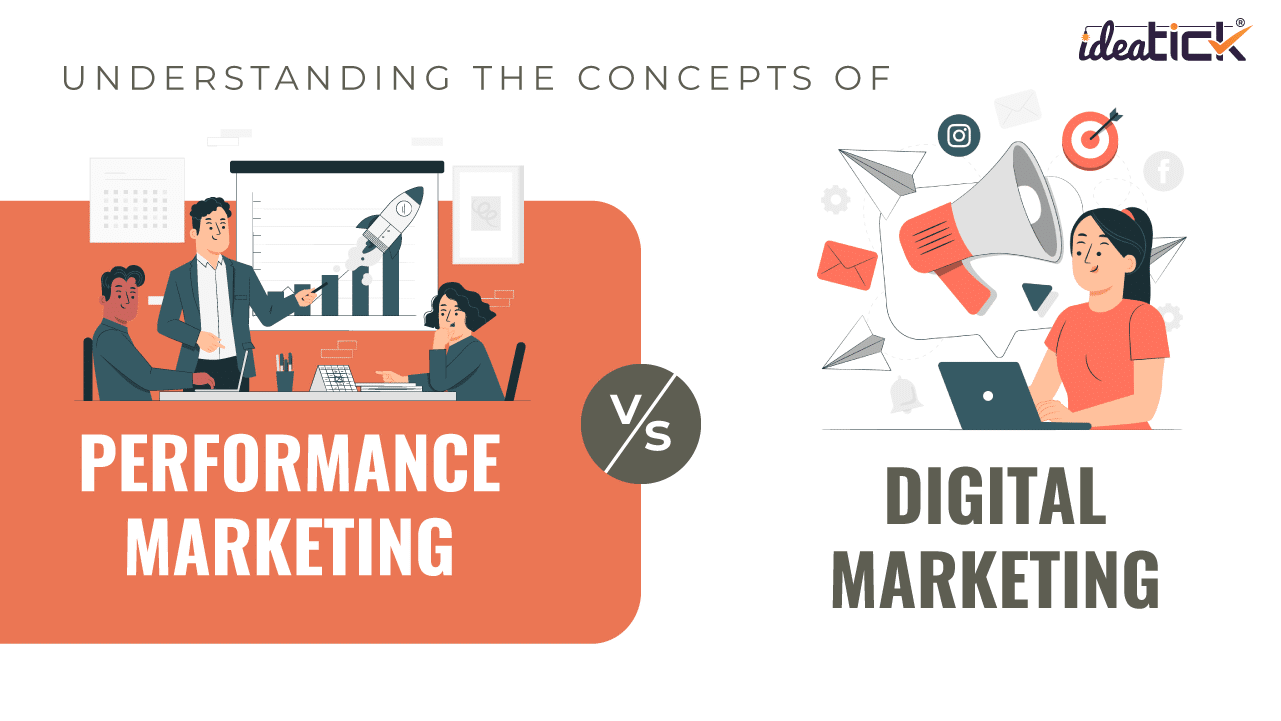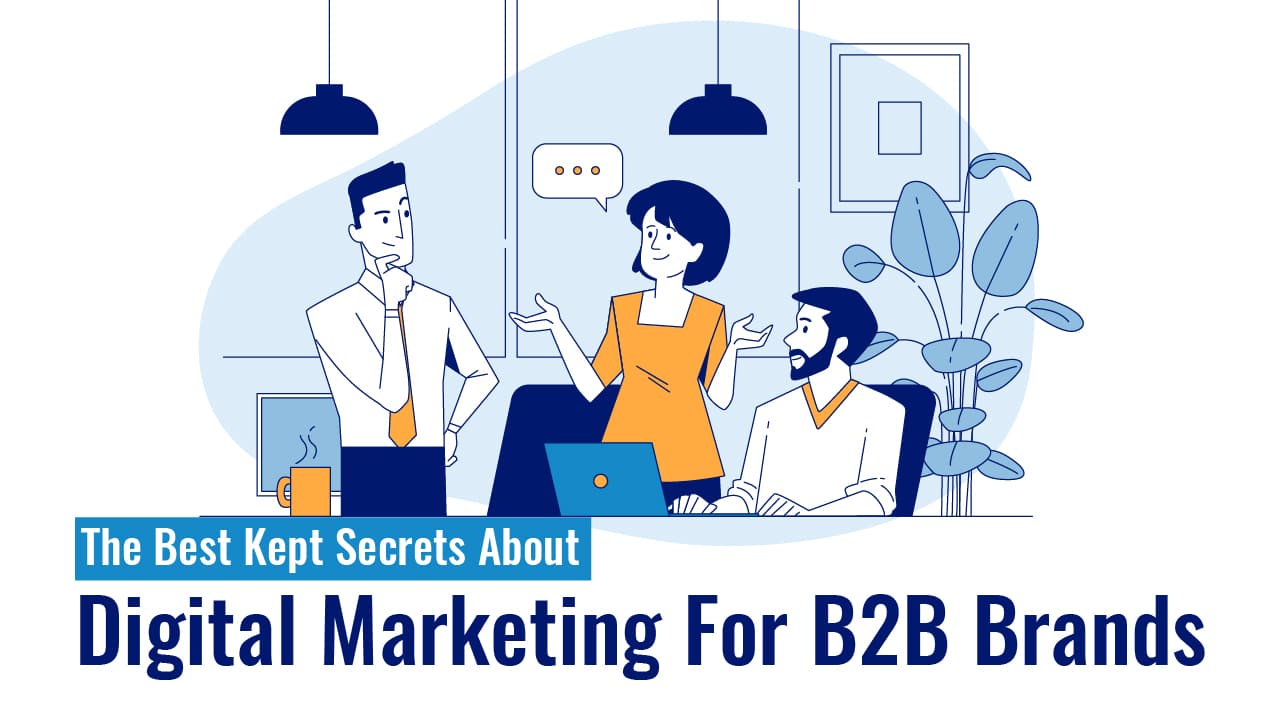Four Basic Strategies To Leverage Digital Marketing For E-Commerce Brands
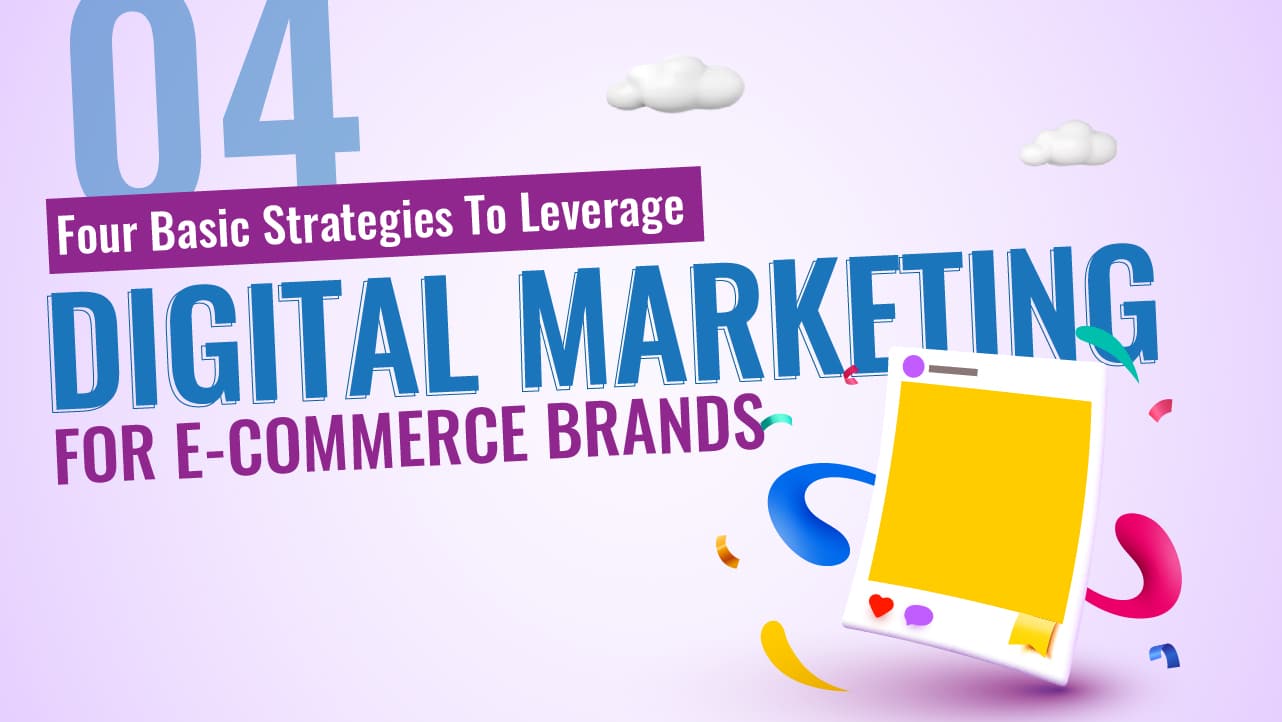
Imagine you’re the owner of a bustling, brick-and-mortar store in a busy shopping district. You have a great selection of products, a welcoming storefront, and an army of loyal customers who keep returning for more. But, despite your success, you can’t help but feel like you’re missing out on something.
Enter digital marketing for e-commerce brands!
Digital marketing is like having a storefront on the busiest street in the world – the internet. With the right strategies, you can reach an infinitely larger audience than any physical store could dream of. And, just like with a physical store, digital marketing can help you attract new customers, retain loyal ones, and build your brand.
But digital marketing is more than just setting up a website and waiting for customers to return to you. It’s about understanding your audience and using data to create targeted campaigns that resonate with them. It’s about creating compelling content that tells your brand’s story and showcases your products in a way that makes people want to buy them. And it’s about being strategic with your advertising budget so that you get the most bang for your buck.
So, if you’re an e-commerce brand looking to take your business to the next level, digital marketing is the key. With the right strategies, you can unlock a world of potential and reach customers you never thought possible. So why wait? Let’s get started today!
Benefits of Digital Marketing for E-Commerce Brands
E-commerce generates significant money with digital marketing since it helps build brand value and a consumer base. When purchasing a product, customers are no longer reliant on content or word-of-mouth; instead, they ensure to read the product reviews across all platforms where the product is displayed.
A recent analysis found that 37 Million visits to social networking sites resulted in around 529,000 orders. Among other things, Facebook aids in increasing website traffic, which results in sales that account for an average of 85% of all sales. Because clients are so easily distracted, it has become crucial to capture their attention. Digital marketing can assist e-commerce enterprises to overcome these difficulties.
- Increased Visibility: Digital marketing can help e-commerce brands to increase their visibility online, making it easier for potential customers to find them. By using search engine optimization (SEO) and pay-per-click (PPC) advertising, brands can improve their search engine rankings and appear at the top of search engine results pages (SERPs).
- Cost–effective: Digital marketing can be a cost-effective way for e-commerce brands to reach a large audience. Compared to traditional marketing methods like print, radio, or TV ads, digital marketing often costs less and offers a better return on investment (ROI).
- Targeted Advertising: Digital marketing allows e-commerce brands to target specific audiences with their ads. With data and analytics, brands can create customized campaigns that resonate with their target audience.
- Social Media Presence: Social media platforms provide a valuable opportunity for e-commerce brands to build their brand and connect with customers. By sharing engaging content and interacting with followers, brands can build a loyal following and drive traffic to their e-commerce sites.
- Measurable Results: One of the significant benefits of digital marketing for e-commerce brands is the ability to track and measure the results of their campaigns. Brands can use data and analytics to see how their campaigns are performing, adjust their strategy accordingly, and improve their ROI over time.
Digital Content Marketing For E-Commerce Brands
Digital content marketing is a powerful tool for e-commerce businesses looking to reach and engage with their target audience. In today’s digital age, consumers are constantly bombarded with ads and promotions, so it’s vital to stand out with valuable, entertaining, and engaging content.
The first step in digital content marketing is understanding your target audience. Who are they? What are their pain points? What motivates them? Once you get a clear understanding of the audience, create content directly addressing them.
How Does Digital Content Marketing Help Drive Online Sales?
Digital content marketing is a powerful tool that can help drive online sales in several ways. According to a B2B Content Marketing Survey by CMI, 40% of B2B marketers have a defined content marketing plan, 33% do not, and 27% have no strategy.
- Builds Brand Awareness: By creating high-quality content that resonates with your target audience, you can increase brand awareness and attract potential customers to your website.
- Increases Website Traffic: With your content through various channels, such as social media and email marketing, you drive more traffic to your website. This increased traffic can lead to more sales opportunities.
- Educates Potential Customers: Creating content that informs and educates your target audience can help them understand the value of your products or services, making them more likely to purchase.
- Builds Trust And Credibility: By consistently creating valuable content, you can establish yourself as a thought leader in your industry and build trust with potential customers. This trust and credibility can lead to more sales and repeat business.
- Supports The Sales Funnel: Digital content marketing can be used at every stage of the sales funnel, from awareness to consideration to conversion. By creating content that addresses the needs and pain points of potential customers at each stage, you can move them closer to making a purchase.
Overall, digital content marketing can help drive online sales by increasing brand awareness, website traffic, education, credibility, and supporting the sales funnel. By investing in digital content marketing, create a powerful online presence that drives more sales and revenue for your business.
Tips for Creating Effective Digital Content
- Know your target audience: Before creating any content, it’s important to know who you’re strategizing with. Identify your target audience and tailor your content to their needs, interests, and preferences.
- Create a content strategy: Develop a content strategy that aligns with your brand’s goals and objectives. It should include the types of content you’ll create, the channels you’ll use to distribute it, and the metrics you’ll use to measure success.
- Use high–quality visuals: High-quality visuals, such as images and videos, can help showcase your products more engagingly. Use professional photography and invest in high-quality video production to make your products stand out.
- Optimize for search engines: Ensure your content is optimized for search engines by using relevant keywords and meta descriptions. It will help your content appear on search engine result pages and drive traffic to your site.
- Use social media to amplify your content: Social media is a great way to reach a larger audience and drive traffic to your site. Use social media channels to promote your content, engage with your audience, and build brand awareness.
- Focus on user-generated content: User-generated content, such as reviews and testimonials, can be a powerful tool for building trust and credibility with your audience. Encourage customers to leave reviews and share their experiences with your products.
- Experiment with different types of content: Experiment with various content types, such as blog posts, infographics, and videos, to see what resonates best with your audience. Use analytics tools to track engagement and adjust your strategy accordingly.
- Provide valuable information: Your content should provide valuable information to your audience, whether educational, entertaining, or informative. It will help establish your brand as a thought leader in your industry and build trust with your audience.
Social Media For E-Commerce Brands
Imagine you’re throwing a huge party and you want everyone to know about it. You could go door-to-door, shouting about your party and handing out flyers. Or, you could use social media to spread the word!
Social media is like a megaphone that allows you to amplify your message and reach a larger audience. For e-commerce businesses, it’s like having a digital storefront that’s open 24/7 and accessible to people. Just like how you would decorate your party venue to make it attractive and appealing, e-commerce businesses can use social media to showcase their products in a visually appealing way. You can create beautiful posts with high-quality images, catchy captions, and engaging videos to grab people’s attention and entice them to check out your products.
But a party isn’t just about showing off your decorations and food – it’s also about engaging with your guests and ensuring they’re having a good time. E-commerce businesses can use social media to interact with customers by responding to comments, answering questions, and sharing user-generated content. Build a community to create strong relationships with your customers and increase their loyalty to your brand.
And just like how you might offer a special deal or promotion to your guests at your party, e-commerce businesses can use social media to offer exclusive discounts and promotions to their followers. It can motivate people to make a purchase and drive sales for your business.
So, whether you’re throwing a party or running an e-commerce business, social media can help you reach a wider audience, showcase your products, engage with your customers, and drive sales. It’s like having a party that never ends!
Benefits of Leveraging the Power of Social Media for E-Commerce Businesses
- Increased brand awareness: Social media allows e-commerce businesses to reach a larger audience and increase their brand awareness. By creating engaging content and promoting it on social media, businesses can attract new followers and potential customers.
- Improved customer engagement: Social media provides a platform for e-commerce businesses to interact with their customers and build strong relationships with them. By responding to comments, answering questions, and sharing user-generated content, businesses can show their customers that they care about their needs and opinions.
- Boosted website traffic: By promoting their products on social media, e-commerce businesses can drive traffic to their website and increase their sales. It is especially true if the business uses social media to offer exclusive discounts and promotions to its followers.
- Better customer insights: Social media analytics tools provide e-commerce businesses with valuable insights into their customers’ preferences, behaviors, and opinions. This information can help businesses to improve their products, services, and marketing strategies.
- Increased customer loyalty: By creating a sense of community on social media, e-commerce businesses can build strong relationships with their customers and increase their loyalty to the brand. It can lead to repeat business and positive word-of-mouth referrals.
Tactics for Utilizing Social Media for E-Commerce Brands
- Identify your target audience: Determine which social media platforms your target audience is frequently using and focus your efforts on those platforms. It will ensure that you’re reaching the right people with your content.
- Create a content strategy: Develop a content strategy that aligns with your business goals and outlines the type of content you will create and share. It could include product photos, videos, blog posts, user-generated content, and more.
- Use high-quality visuals: Use high-quality visuals, such as photos and videos, to showcase your products and grab your audience’s attention. Ensure that your visuals are consistent with your brand’s aesthetic and messaging.
- Optimize your profiles: Optimize your social media profiles by including a clear description of your business, a link to your website, and high-quality profile and cover photos. It will make it easier for people to learn about your business and visit your website.
- Engage with your audience: Use social media to engage with your audience by responding to comments, answering questions, and sharing user-generated content. It will show your customers that you care about their needs and opinions.
- Offer exclusive promotions: Use social media to present exclusive promotions and discounts to your followers. It incentivizes people to make a purchase and drives sales for your business.
- Partner with influencers: Consider partnering with social media influencers who have a large following in your niche. It can help to increase brand awareness and drive sales for your business.
- Use social media advertising: Consider using social media advertising to reach a larger audience and promote your products. Social media advertising can be highly targeted and cost-effective.
- Analyze your results: Use social media analytics tools to track your performance and measure the effectiveness of your social media strategy. It will help you to make informed decisions and improve your results over time.
Search Engine Optimization for E-Commerce Brands
You run an online store that sells handmade shoes. You put a lot of effort into creating beautiful, unique shoes that people will love, but you’re having trouble getting your products in front of potential customers. It is where search engine optimization comes in.
SEO is like a magical spell that helps your website appear higher in search engine results pages (SERPs) when someone searches for keywords related to your products. By optimizing your website for search engines, you can attract more organic traffic to your site, which can ultimately lead to more sales.
Understanding the Basics of SEO and Its Importance for E-Commerce Businesses
- Keyword Research: Just like a wizard needs to know the right words to cast a spell, you need to know the right keywords to optimize your website. Conduct keyword research to identify the most relevant and high-traffic keywords.
- On-Page Optimization: Think of on-page optimization like the ingredients in a potion. You need the correct elements on your website, such as title tags, meta descriptions, and product descriptions, to signal to search engines what your website is about.
- Technical Optimization: Technical optimization is like keeping your wand in good condition so you can cast your spells effectively. You need to ensure your website is mobile-friendly, has fast load times, and has a secure HTTPS connection to ensure it performs well in search engine rankings.
- Content Marketing: Just like a wizard needs to keep practicing their spells, keep creating fresh, engaging content to attract organic traffic to your website. Blog posts, product guides, and social media posts can all help to boost your SEO.
Strategies for Leveraging SEO for E-Commerce Businesses
By leveraging these SEO strategies, e-commerce businesses can increase their visibility in search engine results pages (SERPs), attract organic traffic to their website, and drive more sales.
- Conduct Keyword Research: Conduct thorough keyword research to identify the keywords and phrases that your target audience is using to search for products similar to yours. Use these keywords in your product descriptions, titles, and meta descriptions.
- Optimize Product Pages: Optimize your product pages by including detailed descriptions, high-quality images, customer reviews, and other relevant information that can help search engines understand what your products are and how they can benefit your customers.
- Focus On User Experience: Focus on providing a great user experience on your website by ensuring fast loading times, easy navigation, and a clear information hierarchy. It can improve your website’s overall search engine rankings and encourage users to spend more time.
- Build High-Quality Backlinks: Build high-quality backlinks from reputable websites to improve your website’s authority and trustworthiness in the eyes of search engines. It can help your website rank higher in search engine results in pages.
- Use Social Media: Use social media to promote your products and engage with your customers. Social media activity drives traffic to your website and improves your website’s search engine rankings.
- Leverage Local SEO: If you have a physical store, leverage local SEO by optimizing your website and online presence for local search terms. It can help local customers find your store and increase foot traffic.
- Use Analytics: Use analytics tools to track your website’s performance, monitor your SEO efforts, and make data-driven decisions to improve your search engine rankings and drive more traffic to your website.
Email Marketing for E-commerce Brands
Your online store selling handmade shoes is doing exceptionally well. You put a lot of care and attention into creating beautiful, unique pieces that people will love. You are putting in your best efforts in SEO practices too. But somewhere, you feel something is missing.
Email marketing is like a magical messenger that helps you connect with your customers on a personal level. By sending targeted and personalized emails, you can keep your brand top of mind, build relationships with your customers, and encourage them to return to your store.
How Does Email Marketing Help Generate Sales for E-Commerce Brands?
By leveraging these email marketing strategies, e-commerce brands can generate more sales and revenue, increase customer loyalty and retention, and improve the overall shopping experience for their customers.
- Build Customer Loyalty: By sending regular emails to your customers, you can build a relationship with them and keep your brand top-of-mind. It leads to increased customer loyalty and repeat purchases.
- Personalize the Shopping Experience: Use email marketing to segment your customers based on their interests, behaviors, and purchase history. It allows you to send targeted, personalized messages that are more likely to result in a sale.
- Promote Sales & Special Offers: Use email marketing to promote sales, discounts, and special offers to your customers. It creates incentivized purchases and creates a sense of urgency.
- Recommend Related Products: Use email marketing to recommend related products to your customers based on their purchase history. It can help to increase average order value and drive more sales.
- Recover Abandoned Carts: Use email marketing to send automated emails to customers who have abandoned their shopping carts. It reminds them of the products they were interested in and encourages them to complete their purchase.
- Gather Customer Feedback: Use email marketing to gather feedback from your customers about their experience with your brand and products. It can help you to identify areas for improvement and make data-driven decisions to improve your e-commerce business.
Tips for Creating Effective Email Campaigns:
As an entrepreneur, it is important to stay on top of your marketing tactics. Email campaigns are a great way to new and existing customers and keep them engaged. Here at Ideatick, we understand the importance of effective and creative email campaigns. That’s why we have put together a few tips to help you create effective email campaigns.
- Have a Clear Call-to-Action: Every email campaign should include a clear and concise call to action. It will help guide your readers and make it easier for them to take the desired action.
- Personalize Your Emails: When crafting your emails, it is important to personalize them to the recipient. Use their name and other personal information to make them feel special and encourage them to take action.
- Focus on Quality Content: Instead of focusing on quantity, it is important to prioritize the quality of your content. Make sure that the content is relevant, appropriate, and informative.
- Use A/B Testing: A/B testing is a great way to test out different versions of your email campaign and see which one works best. It will help you tailor your content to the specific needs of your audience.
- Track Your Performance: After you send out your emails, it is important to track your performance and see how well your email campaigns are doing. You can use analytics and other software to track your progress and adjust your strategy accordingly.
By following these tips, you can create effective email campaigns that will help you reach your desired results. If you need any additional help, do not hesitate to contact the Ideatick team. We are always here to help.
Summarizing the Importance of Digital Marketing for E-Commerce Brands
Digital marketing is like a magic wand for e-commerce brands. It helps them reach a wider audience, build brand awareness, and drive more sales. Here are some reasons why digital marketing is essential for e-commerce brands:
- Reach a Wider Audience: With digital marketing, e-commerce brands can reach a wider audience than they could through traditional marketing channels. By leveraging social media, search engines, and other digital platforms, they can connect with potential customers.
- Build Brand Awareness: Digital marketing can help e-commerce brands build brand awareness by creating engaging and shareable content, running targeted advertising campaigns, and leveraging influencer marketing.
- Drive More Sales: With digital marketing strategies like email marketing, social media advertising, and search engine optimization, e-commerce brands can drive more sales and revenue.
- Track And Measure Results: One of the advantages of digital marketing is that it allows e-commerce brands to track and measure their results in real-time. It means they can quickly identify what’s working and what’s not and make data-driven decisions to optimize their marketing campaigns.
- Stay Competitive: In today’s digital age, e-commerce brands should have a solid digital marketing strategy to stay competitive. By staying up-to-date on the latest trends and technologies, they can stay ahead of the competition and continue to grow their business.
Overall, digital marketing is a crucial component of any e-commerce brand’s marketing strategy. By leveraging the power of digital platforms, e-commerce brands can reach more customers, drive more sales, and grow their business cost-effectively and measurably.
How Ideatick Helps E-Commerce Entrepreneurs in Digital Marketing?
Ideatick is a digital marketing agency where we turn your ideas into reality and help your business grow in the digital world. We are a team of creative and strategic thinkers passionate about digital marketing and always up-to-date with the latest trends and technologies. Our goal is to help businesses of all sizes to establish a substantial online presence and reach their target audience through effective digital marketing strategies. From search engine optimization and pay-per-click advertising to social media marketing and content creation, we offer a wide range of services to meet your digital marketing needs. Our team of experts works closely with each client to understand their unique goals and develop customized solutions to achieve them.
- Expertise in E-Commerce: Ideatick specializes in working with e-commerce brands, so they have extensive experience in the unique challenges and opportunities that come with selling products online.
- Comprehensive Digital Marketing Services: Ideatick offers a wide range of digital marketing services, including website design and development, SEO, PPC advertising, social media marketing, and content marketing. It means you can get all the services you need to grow your e-commerce brand under one roof.
- Customized Approach: Ideatick takes a customized approach to each client’s needs, tailoring their services to fit your unique business goals and challenges. It means you get a digital marketing strategy that is specifically designed to help you achieve your objectives.
- Results-Driven Approach: Ideatick focuses on delivering results for its clients. They use data and analytics to measure the effectiveness of their campaigns and make adjustments to optimize performance and maximize ROI.
- Transparent Reporting: Ideatick provides regular reporting and updates on its digital marketing efforts, so you always know how your campaigns are performing and what you are getting for your investment.
Overall, if you are an e-commerce brand looking for a digital agency with a proven track record of delivering results, a customized approach, and a comprehensive suite of services, Ideatick may be a great fit for your business.

